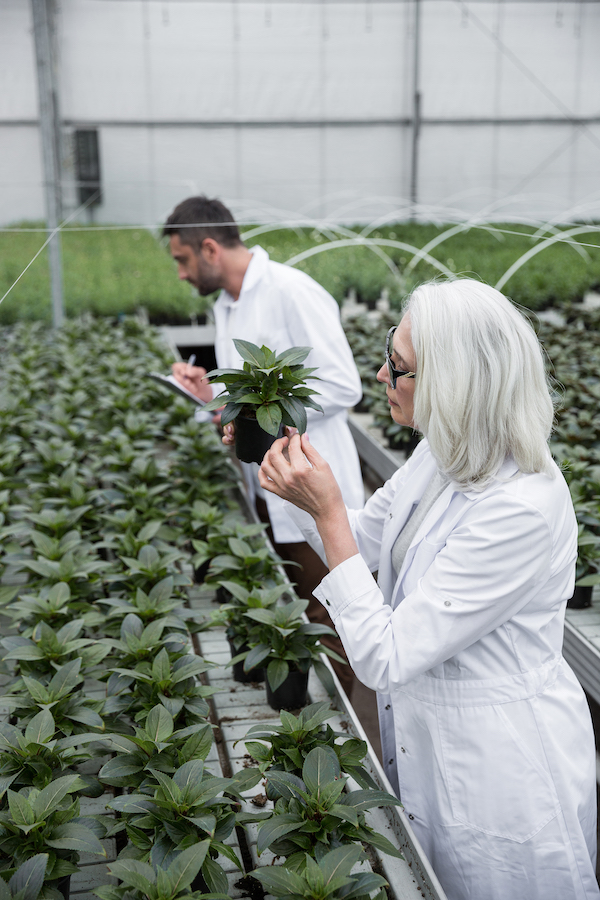2024
Gene networks involved in drought stress response and tolerance
Kazuo Shinozaki, Kazuko Yamaguchi-Shinozaki, Gene networks involved in drought stress response and tolerance, Journal of Experimental Botany, Volume 58, Issue 2, January 2007, Pages 221–227, https://doi.org/10.1093/jxb/erl164
Drought, salt, and temperature stress-induced metabolic rearrangements and regulatory networks
Julia Krasensky, Claudia Jonak, Drought, salt, and temperature stress-induced metabolic rearrangements and regulatory networks, Journal of Experimental Botany, Volume 63, Issue 4, February 2012, Pages 1593–1608, https://doi.org/10.1093/jxb/err460
Improving crop salt tolerance
T. J. Flowers, Improving crop salt tolerance, Journal of Experimental Botany, Volume 55, Issue 396, 1 February 2004, Pages 307–319, https://doi.org/10.1093/jxb/erh003
Engineering the Rhizosphere.
Dessaux, Y., Grandclément, C., & Faure, D. (2016). Engineering the Rhizosphere. Trends in plant science, 21(3), 266–278. https://doi.org/10.1016/j.tplants.2016.01.002
Networked names: synonyms in eighteenth-century botany
Dietz B. (2019). Networked names: synonyms in eighteenth-century botany. History and philosophy of the life sciences, 41(4), 46. https://doi.org/10.1007/s40656-019-0286-6
Warburgia: a comprehensive review of the botany, traditional uses and phytochemistry
Leonard, C. M., & Viljoen, A. M. (2015). Warburgia: a comprehensive review of the botany, traditional uses and phytochemistry. Journal of ethnopharmacology, 165, 260–285. https://doi.org/10.1016/j.jep.2015.02.021
Real Time Analysis of Bioanalytes in Healthcare, Food, Zoology and Botany
Wang, T., Ramnarayanan, A., & Cheng, H. (2017). Real Time Analysis of Bioanalytes in Healthcare, Food, Zoology and Botany. Sensors (Basel, Switzerland), 18(1), 5. https://doi.org/10.3390/s18010005
Next generation editors
Lunn J. E. (2023). Next generation editors. Journal of experimental botany, 74(5), 1291–1292. https://doi.org/10.1093/jxb/erad037
Current Status and Future Prospects of Semiconductor Quantum Dots in Botany
Pang, C., & Gong, Y. (2019). Current Status and Future Prospects of Semiconductor Quantum Dots in Botany. Journal of agricultural and food chemistry, 67(27), 7561–7568. https://doi.org/10.1021/acs.jafc.9b00730
The plant microbiome explored: implications for experimental botany
Berg, G., Rybakova, D., Grube, M., & Köberl, M. (2016). The plant microbiome explored: implications for experimental botany. Journal of experimental botany, 67(4), 995–1002. https://doi.org/10.1093/jxb/erv466
Plant Morphogenesis 123: a renaissance in modern botany?
Bai S. N. (2019). Plant Morphogenesis 123: a renaissance in modern botany?. Science China. Life sciences, 62(4), 453–466. https://doi.org/10.1007/s11427-018-9457-1
Curcumae Radix: a review of its botany, traditional uses, phytochemistry, pharmacology and toxicology
Ao, M., Li, X., Liao, Y., Zhang, C., Fan, S., Hu, C., Chen, Z., & Yu, L. (2022). Curcumae Radix: a review of its botany, traditional uses, phytochemistry, pharmacology and toxicology. The Journal of pharmacy and pharmacology, 74(6), 779–792. https://doi.org/10.1093/jpp/rgab126
Botanicals in Postmenopausal Osteoporosis
Słupski, W., Jawień, P., & Nowak, B. (2021). Botanicals in Postmenopausal Osteoporosis. Nutrients, 13(5), 1609. https://doi.org/10.3390/nu13051609
Abstract
Osteoporosis is a systemic bone disease characterized by reduced bone mass and the deterioration of bone microarchitecture leading to bone fragility and an increased risk of fractures. Conventional anti-osteoporotic pharmaceutics are effective in the treatment and prophylaxis of osteoporosis, however they are associated with various side effects that push many women into seeking botanicals as an alternative therapy. Traditional folk medicine is a rich source of bioactive compounds waiting for discovery and investigation that might be used in those patients, and therefore botanicals have recently received increasing attention. The aim of this review of literature is to present the comprehensive information about plant-derived compounds that might be used to maintain bone health in perimenopausal and postmenopausal females.

The End of Botany
Crisci, J. V., Katinas, L., Apodaca, M. J., & Hoch, P. C. (2020). The End of Botany. Trends in plant science, 25(12), 1173–1176. https://doi.org/10.1016/j.tplants.2020.09.012
Botany, traditional usages, phytochemistry, pharmaceutical analysis, and pharmacology of Eleutherococcus nodiflorus (Dunn) S.Y.Hu: A systematic review
Li, X., Tang, S., Luo, J., Zhang, X., Yook, C., Huang, H., & Liu, X. (2023). Botany, traditional usages, phytochemistry, pharmaceutical analysis, and pharmacology of Eleutherococcus nodiflorus (Dunn) S.Y.Hu: A systematic review. Journal of ethnopharmacology, 306, 116152. https://doi.org/10.1016/j.jep.2023.116152
Botany, traditional uses, phytochemistry, pharmacological and toxicological effects of Croton tiglium Linn.: a comprehensive review
Zhang, T., Liu, Z., Sun, X., Liu, Z., Zhang, L., Zhang, Q., Peng, W., & Wu, C. (2022). Botany, traditional uses, phytochemistry, pharmacological and toxicological effects of Croton tiglium Linn.: a comprehensive review. The Journal of pharmacy and pharmacology, 74(8), 1061–1084. https://doi.org/10.1093/jpp/rgac040
Botany, traditional uses, phytochemistry and pharmacological activity of Crataegus pinnatifida (Chinese hawthorn): a review
Zhang, S. Y., Sun, X. L., Yang, X. L., Shi, P. L., Xu, L. C., & Guo, Q. M. (2022). Botany, traditional uses, phytochemistry and pharmacological activity of Crataegus pinnatifida (Chinese hawthorn): a review. The Journal of pharmacy and pharmacology, 74(11), 1507–1545. https://doi.org/10.1093/jpp/rgac050

Microbiomes in forensic botany: a review
Ishak, S., Dormontt, E., & Young, J. M. (2021). Microbiomes in forensic botany: a review. Forensic science, medicine, and pathology, 17(2), 297–307. https://doi.org/10.1007/s12024-021-00362-4
Forensic botany: who?, how?, where?, when?
Kasprzyk I. (2023). Forensic botany: who?, how?, where?, when?. Science & justice : journal of the Forensic Science Society, 63(2), 258–275. https://doi.org/10.1016/j.scijus.2023.01.002
Synthetic Botany
Boehm, C. R., Pollak, B., Purswani, N., Patron, N., & Haseloff, J. (2017). Synthetic Botany. Cold Spring Harbor perspectives in biology, 9(7), a023887. https://doi.org/10.1101/cshperspect.a023887
